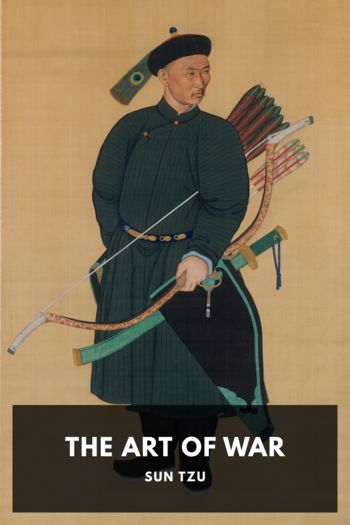The Art of War by Sun Tzu (elon musk reading list TXT) 📕

- Author: Sun Tzu
Book online «The Art of War by Sun Tzu (elon musk reading list TXT) 📕». Author Sun Tzu
過則從 is rendered by Capt. Calthrop: “to pursue the enemy if he retreat.” But 過 cannot mean “to retreat.” Its primary sense is to pass over, hence to go too far, to exceed or to err. Here, however, the word has lost all implication of censure, and appears to mean “to pass the boundary line dividing safety from danger,” or, as Chang Yü puts it, 深陷于危難之地 “to be deeply involved in a perilous position.” The latter commentator alludes to the conduct of Pan Chʽao’s devoted followers in 73 AD. The story runs thus in the Hou Han Shu, ch. 47, fol. 1 vo: “When Pan Chʽao arrived at 鄯善 Shan-shan, 廣 Kuang, the King of the country, received him at first with great politeness and respect; but shortly afterwards his behaviour underwent a sudden change, and he became remiss and negligent. Pan Chʽao spoke about this to the officers of his suite: ‘Have you not noticed,’ he said, ‘that Kuang’s polite intentions are on the wane? This must signify that envoys have come from the Northern barbarians, and that consequently he is in a state of indecision, not knowing with which side to throw in his lot. That surely is the reason. The truly wise man, we are told, can perceive things before they have come to pass; how much more, then, those that are already manifest!’ Thereupon he called one of the natives who had been assigned to his service, and set a trap for him, saying: ‘Where are those envoys from the Hsiung-nu who arrived some days ago?’ The man was so taken aback that between surprise and fear he presently blurted out the whole truth. Pan Chʽao, keeping his informant carefully under lock and key, then summoned a general gathering of his officers, thirty-six in all, and began drinking with them. When the wine had mounted into their heads a little, he tried to rouse their spirit still further by addressing them thus: ‘Gentlemen, here we are in the heart of an isolated region, anxious to achieve riches and honour by some great exploit. Now it happens that an ambassador from the Hsiung-nu arrived in the kingdom only a few days ago, and the result is that the respectful courtesy extended towards us by our royal host has disappeared. Should this envoy prevail upon him to seize our party and hand us over to the Hsiung-nu, our bones will become food for the wolves of the desert. What are we to do?’ With one accord, the officers replied: ‘Standing as we do in peril of our lives, we will follow our commander through life and death’ (今在危亡之地死生從司馬).” For the sequel of this adventure, see chap. XII, note 693. ↩
These three sentences are repeated from chapter VII—in order to emphasise their importance, the commentators seem to think. I prefer to regard them as interpolated here in order to form an antecedent to the following words. With regard to local guides, Sun Tzǔ might have added that there is always the risk of going wrong, either through their treachery or some misunderstanding such as Livy records (XXII 13): Hannibal, we are told, ordered a guide to lead him into the neighbourhood of Casinum, where there was an important pass to be occupied; but his Carthaginian accent, unsuited to the pronunciation of Latin names, caused the guide to understand Casilinum instead of Casinum, and turning from his proper route, he took the army in that direction, the mistake not being discovered until they had almost arrived. ↩
Referring, I think, to what is contained in the following two paragraphs. Tsʽao Kung, thinking perhaps of the 五利 in chapter VIII (“So, the student of war …”), takes them to be 九地之利害 “the advantages and disadvantages attendant on the nine varieties of ground.” The Tʽu Shu reads 此五者. ↩
霸王, “one who rules by force,” was a term specially used for those princes who established their hegemony over other feudal states. The famous 五霸 of the 7th century BC were (1) 齊桓公 Duke Huan of Chʽi (2) 晉文公 Duke Wên of Chin, (3) 宋襄公 Duke Hsiang of Sung, (4) 楚莊王 Prince Chuang of Chʽu, (5) 秦穆公 Duke Mu of Chʽin. Their reigns covered the period 685—591 BC. ↩
Here and in the next sentence, the Yü Lan inserts 家 after 敵. ↩
Mei Yao-chʽên constructs one of the chains of reasoning that are so much affected by the Chinese: “In attacking a powerful state, if you can divide her forces, you will have a superiority in strength; if you have a superiority in strength, you will overawe the enemy; if you overawe the enemy, the neighbouring states will be frightened; and if the neighbouring states are frightened, the enemy’s allies will be prevented from joining her.” The following gives a stronger meaning to 威加: 若大國一敗則小國離而不聚矣 “If the great state has once been defeated (before she has had time to summon her allies), then the lesser





Comments (0)